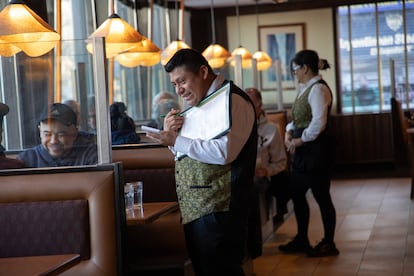Business owners warn of the risk of resuming raids on hotels, farms and restaurants
ICE agents have been allowed to resume arrests shortly after Trump announced they would stop to avoid labor shortages


The back-and-forth decisions of the Donald Trump administration, which contradicts itself within days and sometimes hours, have left those affected in a permanent state of uncertainty about which way the wind will blow next. This is what has happened with the roller coaster of tariffs, which go up one day and down the next, and also with immigration. The latest contradiction affects hotel, restaurant, and agricultural businesses.
These industries barely had time to celebrate the president’s recent announcement that arrests in these areas were being paused, when they learned that the administration was once again reversing its decision and resuming detentions. “This has been going on since Thursday, when we saw the opportunity to ensure restaurants would be recognized as essential businesses. It’s been a very busy weekend. On behalf of the association, we remain very hopeful, and we are so because there is an open dialogue,” said Emily Williams Knight, CEO of the Texas Restaurant Association.
Her remarks came during a virtual press conference scheduled to celebrate Trump’s policy shift, which last week ordered Immigration and Customs Enforcement (ICE) to halt detentions of undocumented migrants in farms, meatpacking plants, hotels and restaurants.
On Monday, however, it emerged that the Department of Homeland Security had reversed that order and given the green light for renewed raids, according to The Washington Post.
Representatives of these industries were forced to adapt their celebratory remarks in response to the unforeseen changes. The conciliatory tone, requesting dialogue leading to a solution, was mixed with a warning about the catastrophic situation that mass arrests of workers are creating in these sectors.
In Texas, restaurants are the largest private-sector employer, with 1.4 million workers, 22% of whom are immigrants, Knight noted, warning of the impact of the ICE raids: “Restaurants in Texas can’t open. They don’t have enough kitchen staff. This also represents a huge economic impact. Those people aren’t coming to work, and they’re not investing in their communities.”
Business owners complain that ICE raids targeting undocumented immigrants are leaving them without workers. They took their concerns to the president, who last Thursday announced changes to detention measures to help “protect our farmers” from the loss of labor.

Pressure within the government
Trump has come under pressure from both sides. Within his own administration, there is tension on the issue. While Agriculture Secretary Brooke Rollings has echoed the farmers’ concerns, one of the architects of the anti-immigration crusade, his advisor Stephen Miller, opposes excluding any sector from the detention drive, according to sources consulted by The Washington Post.
Matt Teagarden, CEO of the Kansas Livestock Association, warned of the risk of rising inflation due to the disruption to the food supply. “In addition to the detained workers, [the raids] also instill fear in these communities, even among legal workers” who are not showing up for work, he said, although he emphasized that he is “encouraged that the president has recognized the need for a balanced approach to this issue.”
Teagarden mentioned the ICE raids last week at a meatpacking plant in Omaha, Nebraska that resulted in the arrest of 70 people. The arrests sparked street protests, and several businesses closed due to the fear in an area where a quarter of the residents are foreign-born. “We can either use imported workers or import our food,” he noted.
Executives are calling for arrests to focus solely on criminals, as the administration initially said it would do. But the reality is that, to achieve the goal of carrying out the largest deportation in U.S. history, it is necessary to broaden the spectrum of deportable individuals. Therefore, ICE agents have not limited themselves to immigrants with criminal records, and in fact less than 10% of those detained have a criminal record.
Business leaders argue that, even with rising unemployment, Americans don’t want to do the jobs done by migrants, many of whom are undocumented, so they’re calling for a way to legalize their status, rather than deport them.
“We appreciate the administration’s understanding of the importance of the workforce, but we need action. Seventy-two percent of the thoroughbred industry is immigrant, and we can’t operate without them. We need workers to feed and care for these horses every day,” said Dale Romans, president of the Kentucky Horsemen’s Benevolent and Protective Association, which represents over 6,000 owners and trainers of thoroughbred racehorses.
Cattle farms have also been targeted by ICE. Beverly Idsinga, executive director of Dairy Producers of New Mexico, cited as an example a farm where immigration agents arrested 35 of its 55 employees. “You can’t run a farm like that. You can’t turn off the cows. They have to be milked and fed twice a day,” she explained. The owner has had to rely on high school students on summer vacation to do the job.
Business organizations have been warning for months about the negative effects of dispensing with undocumented workers, the driving force of sectors such as agriculture and restaurants. These workers are the backbone of many industries: 22% of restaurant workers, 51% of dairy and livestock workers, and 72% of horse racing workers are foreign-born, according to Rebecca Shi, CEO of the American Business Immigration Coalition.
“The president’s recommendation last week to suspend ICE enforcement measures on farms, restaurants, and hotels was an important step in the right direction. Now we need Congress and the administration to move forward with real solutions: work visas for essential workers who pay taxes, stabilize the economy, and contribute to their communities,” she said.
Sign up for our weekly newsletter to get more English-language news coverage from EL PAÍS USA Edition
Tu suscripción se está usando en otro dispositivo
¿Quieres añadir otro usuario a tu suscripción?
Si continúas leyendo en este dispositivo, no se podrá leer en el otro.
FlechaTu suscripción se está usando en otro dispositivo y solo puedes acceder a EL PAÍS desde un dispositivo a la vez.
Si quieres compartir tu cuenta, cambia tu suscripción a la modalidad Premium, así podrás añadir otro usuario. Cada uno accederá con su propia cuenta de email, lo que os permitirá personalizar vuestra experiencia en EL PAÍS.
¿Tienes una suscripción de empresa? Accede aquí para contratar más cuentas.
En el caso de no saber quién está usando tu cuenta, te recomendamos cambiar tu contraseña aquí.
Si decides continuar compartiendo tu cuenta, este mensaje se mostrará en tu dispositivo y en el de la otra persona que está usando tu cuenta de forma indefinida, afectando a tu experiencia de lectura. Puedes consultar aquí los términos y condiciones de la suscripción digital.








































